‘We haven’t heard anything from a Democrat or Republican’

DETROIT — On a rainy, cloud-muted evening, a group of Black men dressed all in black, some with handguns holstered to their hips and pamphlets in their hands, marched down one of the main strips of the west side of Detroit to a steady stream of handshakes and hugs.
“People know that we really put in work. They see us out here in the community,” the group’s leader, Zeek Williams, said between honks from passing cars and renditions of Detroit’s ubiquitous colloquial greeting, “Whatup Doe!”
“We gotta be out here,” Williams said. “We gotta be the ones to be out here to step with our people, make sure that we are, you know, putting on for the culture, as we like to say.”
Williams is the founder of New Era Detroit, a community-based organization that connects residents in some of the city’s most disinvested neighborhoods with badly needed resources. The needs include public safety, housing support and youth and political education programs, and the group does everything from armed patrols of crime hot spots to hosting massive community cleanup efforts and block parties that double as resource fairs. It’s always looking to secure grants and public funds to redistribute to neighborhoods in the most need.
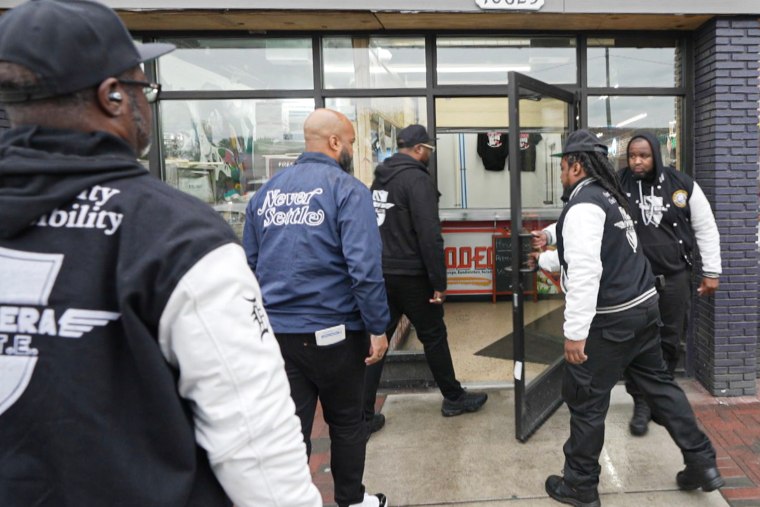
Williams describes New Era Detroit’s role as filling the often-massive gap between the people and the politicians in his city. It’s not an explicitly political group. But it is a window into a key group of voters whom both parties are eying — and perhaps misunderstanding — ahead of the 2024 election: Black men.
Public opinion polls find larger numbers of Black men up for grabs now than in past elections. President Joe Biden and former President Donald Trump are both making appeals to them. But there’s also a persistent sense among Williams and others in his orbit, in a battleground-state big city, that no one in the political world is really trying to build true relationships with Black people, especially Black men like those in New Era. Some are questioning not just whom to support for president but whether to vote at all.
“We are one of the leading organizers on the ground in the city of Detroit. Literally the closest that you’re gonna get to Black people in this city,” Williams said. “But we haven’t heard anything from a Democrat or Republican.”
Votes up for grabs
Men like them, in communities like theirs, in battleground states like Michigan, might feel overlooked, but they could very well hold the power to determine who wins the White House in November. And both Democrats and Republicans know as much, vying in their own ways for Black male attention and votes.
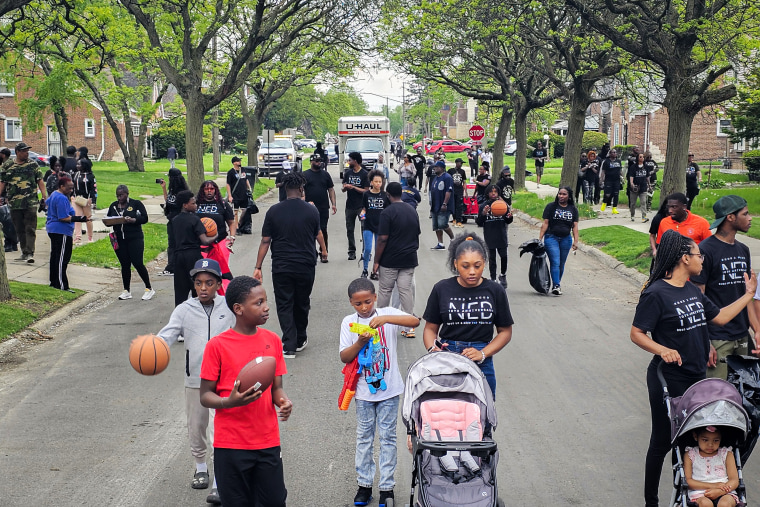
Trump, in controversial fashion, has used his criminal court cases and the release of a gaudy signature gold sneaker to appeal to younger Black men.
“I got indicted a second time and a third time and a fourth time, and a lot of people said that that’s why the Black people like me,” Trump said this year at a gala sponsored by Black conservatives in South Carolina, “because they have been hurt so badly and discriminated against, and they actually viewed me as I’m being discriminated against.”
In recent weeks, the Biden administration has ramped up engagement with Black voters. Late last month, Vice President Kamala Harris kicked off her “Economic Opportunity Tour,” a multi-city effort to reconnect with Biden’s base of Black support and highlight what he has delivered.
“The data is clear,” Harris told NBC News at her stop in Atlanta. “Black men have not benefited proportionately to other populations in terms of economic opportunity and economic health, much less wealth creation.”
Harris continued the thread a week later in a visit to Detroit, where she told an audience, “Since 2019, Black wealth is up 60%, so President Biden and I are clear: These are not only our accomplishments; they are yours. … It is the result of your drive, your creativity and your power.”
And Biden sat down this week with a popular Black radio host, WVEE-FM’s Darian “Big Tigger” Morgan, in Atlanta, where he talked about the Biden-Harris administration’s accomplishments for Black Americans and the stakes of the election.
“Look, Trump hurt Black people every chance he got as president,” Biden said, pointing to unemployment rates, Trump’s tax cuts and Trump’s Covid-19 response and its effect on Black Americans.
“Your vote is your voice,” Biden continued. “Lots of close elections, these last couple, and every vote counts.”
Ahead of the election, Black voters’ traditional alignment with Democrats and Biden is showing signs of slipping.
Recent polling has found Trump in the high teens or the low 20s among Black voters — still well behind Biden, but also well ahead of where he polled in 2020.
And there are significant breaks along generational and gender lines. Younger Black voters are more open to the idea of supporting Trump. And while Black women remain a more loyal Democratic voting bloc, Black men have shown more political malleability.
That could have big effects in a state like Michigan, where Trump won in 2016 in part because of a dip in Black voter turnout from 2012. While Hillary Clinton beat Trump in Detroit in 2016, she did so with 46,872 fewer votes than President Barack Obama got just four years earlier. And amid wide dissatisfaction with both major-party candidates this year, there’s concern among some that turnout may very well look similar to that of 2016.
Meanwhile, in recent months, Biden, Harris, Trump and third-party candidate Robert Kennedy Jr. have all made trips to Michigan without visiting the mostly poor and mostly Black neighborhoods where New Era has made its mark.
While Biden has locked in on traditional Black voters and continues to meet them where they are, he could be overlooking a huge swath of atypical but reachable Black voters. He will be back in Detroit over the weekend, keynoting the Detroit NAACP chapter’s marquee fundraising event with thousands of Black Detroit’s movers and shakers, 10 miles and a world away from New Era’s Detroit.
The glaring absence of a true ground presence in New Era’s neighborhoods could spell trouble for the candidates in what is likely to be a close race.
“You wouldn’t even be able to tell this is an election year in our communities, unless somebody flies in for a day and gives a speech. Other than that, you know, it’s business as usual,” Williams said. “You got to think, man, we live in communities where people are worried about their next meal, where people are worrying about if they’re going to be able to keep the lights on. So you have to excuse our people sometimes when we’re not all into two political candidates who ultimately don’t relate or connect to us.”
On this day, Williams and his team were canvassing an area in West Detroit that’s in more need than most. At a gas station where women have been robbed, they pumped gas for customers and pointed to the New Era “Safe Zone” sticker on the station’s glass door, with instructions to scan a QR code if they’re ever in danger. They rolled through a nearby liquor store, about six men deep, to check on the store’s clerks.
“Their presence kind of lets people know that we’re all in it together. You know, that we’re not over here by ourselves,” said Sherri Smith, one of the vendors at a food hall named Whatcha Wanna Eat. “What they do for the community is worth its weight in gold.”
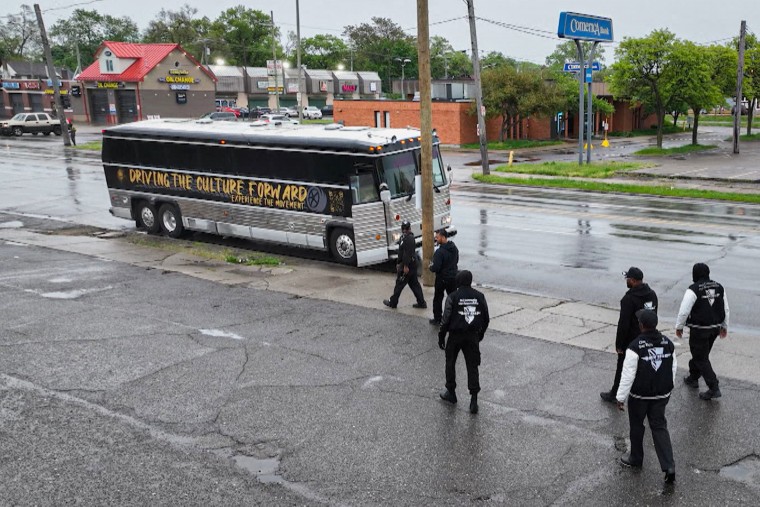
The verdict on political outreach: ‘It’s not real’
Back at New Era’s headquarters, a gutted, renovated, converted former weed shop, the walls are lined with photos from the group’s work in the community and a large map of the U.S., with markers pointing to a growing list of New Era chapter cities, among them Baltimore; Cleveland; Newark, New Jersey; Philadelphia; and Miami.
“In this place, we provide all different types of tangible resources,” Williams said, citing struggling with utility bills to dealing with harassment in the community.
That kind of connection in the community has situated the group in an enviable political space. It has worked with local candidates to help get them in front of prospective voters, and it hosts voter education classes so people have a better sense of policy issues and how they affect them and their communities.
“When people come to our communities and pander for votes, and we know we have never seen this person before ever, and they finally come to our communities and say, ‘Hey, you know, I’m trying to get your vote,’ that’s done. We know it’s fake. We know it’s not real. Therefore, it turns us off with the process,” Williams said.
“The things that politicians are supposed to be able to do for us in our communities are real things,” he continued. But connection between the political system and the community “has not felt real to us.”
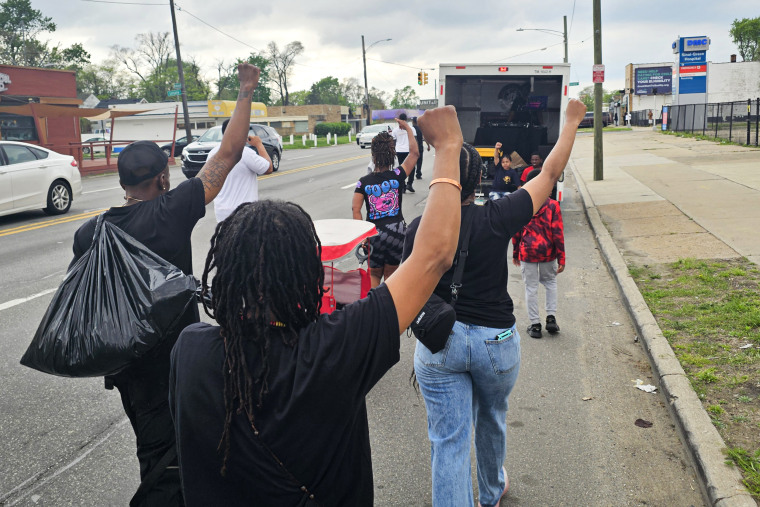
That afternoon, a line of people stretched from New Era’s front door out into its parking lot. The organization had put out a social media blast about securing funding to help folks in need. People who were facing eviction, behind on their utility bills or needing help with medical debts all came down to see what New Era could do.
“It means a lot to me. This is my son, and he’s doing what he’s always done: care for the people,” said Ozzie Williams, Zeek’s father, who also works with New Era.
Asked whether any of the presidential candidates have piqued his interest or earned his vote, he said just one: Joe Biden.
“Me and my family, we’re Democrats, OK? It is what it is. Donald Trump is Donald Trump,” he said.
Zeek Williams said that neither Trump nor Biden has earned his vote yet and that he’s not even sure whether he’ll vote in the election. “How can you ask us as a whole, like, how can these people earn your vote? We’ve never seen these people. You know what I mean? They’re not real people. When they come to Michigan and they come to these places — but it’s not in our places.”
DeAndre Richardson, a family friend who’s also New Era’s head school liaison and is part of New Era’s patrol unit, chimed in, saying that he’s undecided between Biden and Trump but that he’s also seeing a shift in the way many younger Black men are engaging with the political parties.
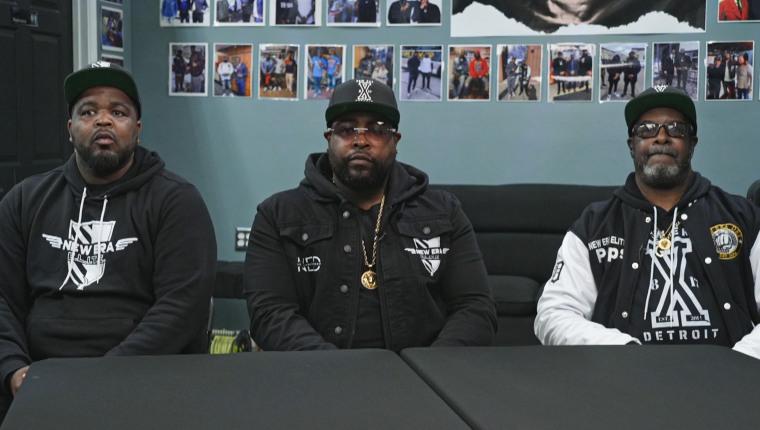
“Yeah, they question a lot more. Especially on the blue side. It’s a lot of people shifting from blue to red, blue to red, because people are seeing the type of person you are instead of your politics,” Richardson said.
All three of the men agreed on one other thing: Any candidate who wants to earn and expand the Black male vote is going to have to show up and be consistent.
“We just want to see you and touch you and feel your vibe,” Richardson said. “We are energy people; we feel energy. So bring your energy back to the block. And then we’ll make our observations.”







